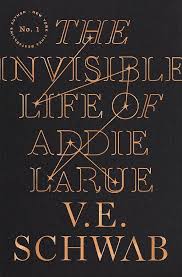Chapter I
byChapter I takes place in New York City on a chilly morning, March 10, 2014, where a woman named Jess lies in bed beside a man named Toby. The two have spent the night together, but the woman’s true identity remains hidden—she is, in fact, Addie LaRue, a woman with a history long erased from the minds of those around her. She has long given up on expecting any connection to last; her true self, her past, and her very name are burdens too heavy for fleeting relationships to carry. For Addie, adopting the name “Jess” is an act of temporary escape, something she can offer others so that they can enjoy a brief interaction without the weight of her unchangeable past.
As Toby begins to stir, Addie watches him, her feelings a mixture of tenderness and quiet resignation. This pattern of impermanence is nothing new to her—she’s walked this path countless times, and yet, each encounter still stirs something within her. Though she longs for a deeper connection, she knows the inevitable truth: Toby will soon forget her, as everyone else does. His presence in her life is just another in a long line of transitory moments, ones where she leaves her mark but never truly stays. With quiet grace, she slips away from his side, walking out of the bedroom and into the living room where she is surrounded by the detritus of his life—a musician’s cluttered apartment, the tangible evidence of a man living, while she merely exists.
In the solitude of the apartment, Addie makes herself a cup of tea, wrapping herself in a blanket as the morning air bites at her skin. She sits by the window, reflecting on her eternal solitude, lost in her thoughts about the fleeting connections she’s made over the centuries. Her fingers idly find their way to the piano, a familiar comfort, and she plays a soft, lilting melody. The music fills the room, a fragile thread connecting her to a world that doesn’t remember her, a world that moves on without ever noticing the marks she leaves behind. Toby, now fully awake, stumbles into the room, listening to the tune, confused yet strangely familiar with it. He expresses an odd sense of recognition but can’t place where he’s heard it before. Addie quietly smiles to herself, knowing that this, too, will fade from his memory once she’s gone. It’s the only form of permanence she can ever have—an unremembered influence, a small act of creation that leaves the smallest ripple in a vast sea of oblivion.
Despite their brief exchange over the music, Addie knows that her time with Toby is running out. He doesn’t challenge the fleeting nature of their connection, accepting her presence as something that must simply fade into the background of his life. His confusion, his inability to place her or the music, speaks volumes of the curse she carries—she is the spark that ignites inspiration in others, only to disappear from their minds as soon as she’s gone. For Addie, this paradox defines her existence—an eternal observer, a transient participant. She struggles with the painful reality of her situation: she is alive, but untethered, forever absent in the memories of those she encounters.
As she stands to leave, Addie is met with the familiar tension between desire and the inevitable conclusion of their encounter. Toby’s polite requests to stay or revisit the moment only highlight the chasm between them. She silently acknowledges the differences in their experiences—her centuries of life, his fleeting hours—before walking out of the apartment and into the bustling city. The sense of hope she carries with her is bittersweet—she continues to long for a deeper connection, even though she knows she is destined to remain a ghost in the lives of those she touches. Addie leaves, her departure almost unnoticed, as she steps back into the city that moves relentlessly forward, indifferent to the woman who has walked its streets for centuries, carrying with her the weight of endless forgotten memories.


